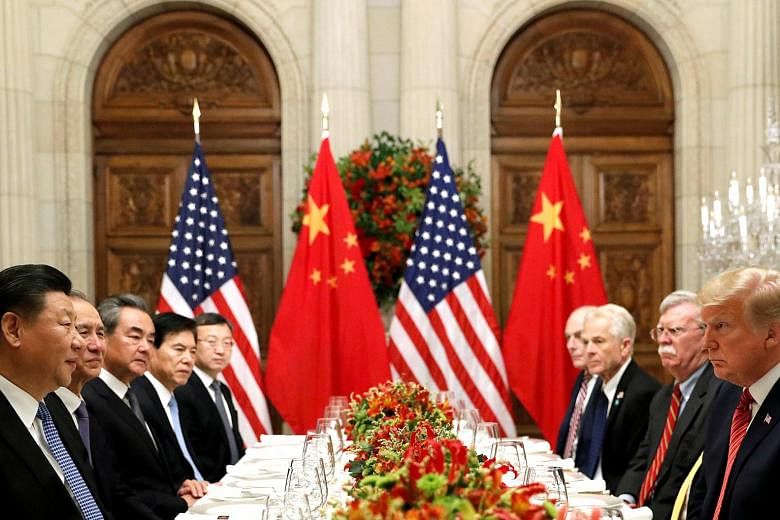BEIJING (REUTERS, BLOOMBERG, AFP) - The summit between President Xi Jinping and his US counterpart Donald Trump in Argentina was "friendly and candid" and would help to avoid further trade tensions, a senior Chinese diplomat said Thursday, but offered no new details on the talks.
The two leaders held high stakes discussions on the sidelines of the G-20 meeting in Buenos Aires last week and agreed to a ceasefire in their trade war.
State Councillor Wang Yi, the Chinese government's top diplomat, said the talks about trade frictions had been extremely positive and constructive, helping reach a consensus that worked for both China and the United States.
Mr Xi and Mr Trump had "deep exchanges in a friendly and candid atmosphere", setting the direction for an appropriate resolution to the problems between the two countries, Mr Wang said, in a statement carried on the foreign ministry's website.
"The two sides agreed to jointly promote Sino-US relations based on coordination, cooperation and stability, and promote exchanges and cooperation in various fields in the two countries to achieve even more results," he added.
"The discussions on economic and trade issues between the two sides were very positive and constructive, and reached a principled consensus."
That consensus included preventing trade frictions from spreading, returning to dialogue to resolve issues, and a joint goal of cooperation to benefit the global economy, Mr Wang said.
"All of these help to safeguard China's legitimate interests, and are also in the interests of the United States, and even more are in line with the expectations of the international community," he added.
China and the US had announced a truce in their trade war after the meeting between Mr Trump and Mr Xi last Saturday, but that quickly descended into confusion, with both sides announcing different statements on what was agreed. There has also been confusion just on the US side, with the White House, Mr Trump and his advisers making conflicting statements as to the details of a deal.
The two countries have hit each other with tit-for-tariffs on goods worth hundreds of billions of dollars in sectors from automobiles to agriculture and energy, stymieing trade and redrawing global supply chains.
The US has levied additional duties of between 10 per cent and 25 per cent on US$250 billion (S$x billion) of Chinese goods this year as punishment for what it calls China's unfair trade practices. China has responded with its own tariffs.
But as part of the truce agreed to by Mr Xi and Mr Trump, the US will not raise tariffs further on Jan 1, so further talks can take place.
Mr Wang said the facts will prove that the common interests between China and the US are greater than our differences, and cooperation needs to be greater than friction.
However he offered no new details on what China had agreed to with the United States.
China expressed confidence on Wednesday that it can reach a trade deal with the US, a sentiment echoed by Mr Trump a day after he warned of more tariffs if the two sides could not resolve their differences.
President Trump said on Twitter Wednesday that China was sending "very strong signals" following the weekend trade discussions.
"Not to sound naive or anything, but I believe President Xi meant every word of what he said at our long and hopefully historic meeting," he said.
The White House has said China had committed to start buying more American products and lifting tariff and non-tariff barriers immediately, while beginning talks on structural changes with respect to forced technology transfers and intellectual property protection.
China's Ministry of Commerce said in a statement on Wednesday Beijing will start to quickly implement specific items where there's consensus with the US and will push forward on trade negotiations within the 90-day "timetable and road map".
On Thursday, commerce ministry spokesman Gao Feng said at a regular press briefing that China "will immediately implement the consensus both sides already reached on agricultural products, energy, autos and other specific items".
The two sides will also discuss intellectual property protection, technology cooperation, market access and balanced trade, and "work hard to reach a consensus", Mr Gao said.

